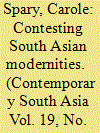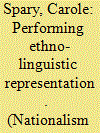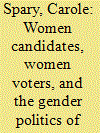|
|
|
Sort Order |
|
|
|
Items / Page
|
|
|
|
|
|
|
| Srl | Item |
| 1 |
ID:
104007


|
|
|
|
|
| Publication |
2011.
|
| Summary/Abstract |
This Editorial introduces the papers in this special conference issue of Contemporary South Asia, placing them in the context of the 24th British Association for South Asian Studies (BASAS) annual conference, held at the University of Warwick in March 2010. The conference theme was 'Landscapes of the imagination', and the papers in this Special Issue reflect a range of approaches to this theme, in terms of methodology, topic and regional spread. Despite their diversity, however, the papers do reflect a common concern to contest a singular, unproblematic and unified experience of South Asian modernity.
|
|
|
|
|
|
|
|
|
|
|
|
|
|
|
|
| 2 |
ID:
101428


|
|
|
|
|
| Publication |
2010.
|
| Summary/Abstract |
This article explores the performance of ethno-linguistic representation in the national parliament of India, analyzing language practices in debates and ceremonies. Despite a policy of official multilingualism, strong institutional norms prioritize English or Hindi as the two official languages of parliament. However, regional languages are more popular in some forms of debate and ceremonies than others, particularly in the oath/affirmation as a means of affirming cultural identity. I identify three narratives-functional, instrumental, and affective-that Members of Parliament employ to explain language practices in parliament and to show how parliamentary multilingualism is associated with some ethno-linguistic communities more than others.
|
|
|
|
|
|
|
|
|
|
|
|
|
|
|
|
| 3 |
ID:
173330


|
|
|
|
|
| Summary/Abstract |
Gender quota campaigns to increase women’s parliamentary presence in India have been ongoing for more than twenty years. Meanwhile, each general election results in the slow growth of women MPs, partly due to political parties nominating few women. The 2019 election was no different in this respect –women still make up fewer than 15% of lower house MPs. Incidents of gendered violence against women candidates also contributed to a characterisation of 2019 as a ‘toxic’ election, and will likely further discourage women’s entry into politics. One positive development, however, was two regional parties’ implementation of voluntary party gender quotas in their parliamentary candidate nominations. This article focuses on women’s political participation as candidates and voters in the 2019 parliamentary election. Parties are scrutinised as key gatekeepers for women’s political recruitment. The article also discusses the new narrative of the growing power of women voters in India, exemplified by closing gender gaps in voter turnout, and representing another aspect of women’s political engagement, potentially influencing parties’ responsiveness to women voters. The article concludes by discussing the broader implications and significance of the 2019 election, areas for further research, and prospects for women’s participation and representation in the new parliament.
|
|
|
|
|
|
|
|
|
|
|
|
|
|
|
|
|
|
|
|
|